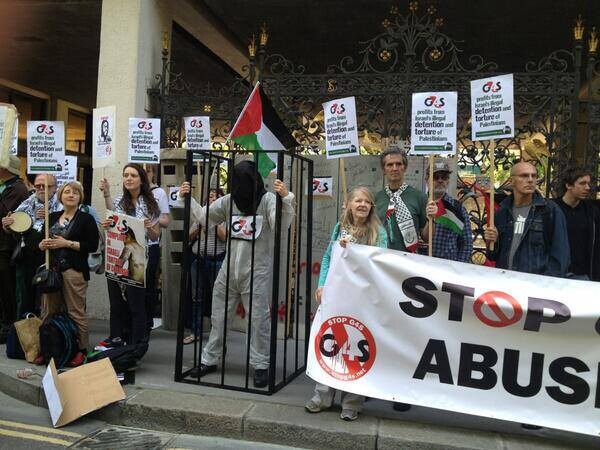Activism and BDS Beat 7 June 2013

Protesters outside the G4S Annual General Meeting in London.
Palestine solidarity activists, Stop G4S campaigners and a Danish member of parliament combined to take over the annual general meeting of G4S in London Thursday afternoon and focused the spotlight on the security company’s complicity in human rights abuses against Palestinians and others. G4S is a British-Danish firm which provides services to Israeli military checkpoints and prisons as well as security contracts worldwide.
Just minutes after it started, the meeting was disrupted by the sound of a horn which was the signal for approximately ten Stop G4S campaigners to rush to the front of the room, where the CEO and board members were seated, shouting “Who killed Jimmy Mubenga? G4S did!”
The reference was to Jimmy Mubenga, a 46-year-old Angolan who died while handcuffed to G4S security guards on board a plane at London’s Heathrow Airport in 2011. He was being restrained during deportation.
The protest was a bad start to the afternoon for Ashley Almanza, G4S’ new CEO, who took over the post on 1 June. He remained silent as the campaigners unfurled a banner with the words “Stop G4S” and read out details of Mubenga’s death.
They did not have time to read a prepared protest poem about the treatment of Palestinians in Israeli jails before they were removed by security.
Their exclusion, however, didn’t result in an improvement in the situation for Almanza or the board.
Torture in Israeli jails
As chair, John Connolly, struggled to bring the AGM back to its more normal concerns of shares and profits, activists from Palestine Solidarity Campaign (PSC) and War on Want intervened.
Question after question was put to the board about G4S’ contracts with the Israeli prison service by campaigners who had bought shares in order to attend the meeting.
The first was from Danish MP, Nikolaj Villumsen, of the Red-Green Alliance, who had flown to London specifically to attend the AGM.
Villumsen asked how G4S could square its claims to be committed to human rights, made in its corporate social responsibility report, with the service it provides to Israeli prisons. In these jails, Villumsen pointed out, “Palestinians are imprisoned and, the UN says, tortured.”
In response, Almanza made the extraordinary claim that G4S does not believe “breaches of international humanitarian law” are taking place inside Israeli jails.
He added: “The board and management commissioned an independent review of our operations in Israel. This was carried out by Professor Hjalte Rasmussen at Copenhagen University, and he concluded that our activities are all consistent with international humanitarian law.”
Almanza was immediately challenged by Salim Alam, a member of PSC’s executive committee. Alam informed G4S’ CEO that Rasmussen had written his report in 2010 without visiting any Israeli jails.
Alam added: “Before you opine on something as serious as that, you would normally go on a field visit.”
Public relations disaster
From then on, the meeting quickly descended into a public relations disaster for the world’s largest security company. Of the 16 questions asked during the two-hour meeting, seven were about G4S’ Israeli prison contracts.
These were tweeted to the outside world by national newspaper journalists, who had been invited to attend. Reports later that same day in the Guardian described how Almanza “faced a barrage of tough questions over the security company’s business in Israel at his first meeting with shareholders.”
The Telegraph reported how “shareholders urged G4S to drop the ‘toxic contract’” with Israeli prisons in “a meeting dominated by questions over three Israeli prison contracts in occupied Palestine and the death of Jimmy Mubenga.”
It was an unusual move for G4S to invite journalists into its annual general meeting. If it had thought that it could control the story and portray a new face, with a new CEO, following the public relations fiasco of its Olympics security contract last year, it was sorely mistaken.
The Palestinian agenda and Jimmy Mubenga dominated the day, both inside the meeting room and on the street outside, where noisy activists, headed by samba musicians, sang and chanted to a backdrop of a mock apartheid wall and prison cage, complete with hooded “prisoner.” All other business was completely overshadowed.
Inside, as campaigners brought up the issue of child prisoners and repeatedly demanded to know when G4S would end its contracts with Israeli prisons, G4S Chair John Connolly was forced to admit: “We’re not blind to the observations and questions that have been raised a number of times today.
“We have no business to be associated with inappropriate breaches of the type that have been referred to today. We will constantly keep under review any developments, including those that you have referred to. I can assure you that the consequences of this review will be appropriate.”
However, like Almanza, Connolly insisted that no breaches of “humanitarian international law,” as he also referred to it, were taking place in Israeli prisons.
No profiting from occupation
G4S has operations in approximately 125 countries across the globe. It equips and provides services to Israeli prisons where Palestinian children, women and men are held, often without trial, and routinely abused and tortured. It also supplies full body scanners and luggage scanning equipment to Israeli checkpoints in the West Bank, and full body scanners to the Erez checkpoint in Gaza.
Its complicity in, and profiting from, Israel’s illegal occupation and its persecution of the Palestinian people has turned the company into a major target for the boycott, divestment and sanctions (BDS) campaign.
Speaking after the Annual General Meeting, which he attended, Hugh Lanning, Chair of PSC, said: “G4S has learned from today’s AGM that there’s a price to be paid for profiting from Israel’s crimes. PSC’s campaign against G4S will continue until it stops making money from human rights violations, illegal detention and torture against Palestinians and withdraws from doing business with Israel’s prison service.”
Rafeef Ziadah, War on Want’s senior campaigner, was also in the meeting. She said afterwards: “G4S provides equipment and services to Israeli prisons where Palestinian political prisoners, including child prisoners, are detained and tortured illegally inside Israel. We are taking our message directly to the G4S board of directors and shareholders at their annual meeting, in order to call for an end to G4S complicity in Israel’s occupation.”
The BDS campaign against G4S is already bearing fruit. Charities in the Netherlands have cut ties with the company in protest at its involvement in the Israeli occupation, while, in Norway, a campaign by students and academics led to the University of Oslo terminating its G4S contract. Student unions in Scotland have forced their universities to take the same action.
Thursday’s actions brought the message directly to G4S’ CEO, its chair and its board members, who sat stony faced throughout what must have been an unexpected ordeal. If they didn’t know before this meeting how much heat the BDS campaign is prepared to put on their company, they certainly do now.






Comments
The death of Jimmy Mubenga
Permalink Adam replied on
The death of Jimmy Mubenga was a one time occurrence and is not a reflection of the overall company's treatment of deportee cases. Just consider the scale, the number of people that it works with, and how rare this occurrence was.
On the subject of Israeli prison contracts, I don't think anyone has yet come up with a coherent argument as to how G4S is breaching any law. On top of that, what makes BDS campaigners think that the cancellation of G4S contracts would have any effect on the prison system in Israel? Most countries run prison services using domestic companies, if North Korea can do it, I'm sure Israel will figure out how too.
GS4
Permalink val replied on
It may be so that Israel will figure out how to run prison services using domestic companies but at least some people will have fought hard to stop a British company from being involved in that despicable business.
Re: The death of Jimmy Mubenga
Permalink Michael replied on
Adam Jimmy Mubenga is sadly not an isolated case. Fifteen-year-old Gareth Myatt died after restraint by G4S guards at Rainsbrook Secure Training Centre near Rugby in 2004. More than 750 complaints of abuse have been made about G4S over their involvement in the UK migrant detention and deportation system. Read more here: http://www.corporatewatch.org/...
I do agree that it would be helpful to have a detailed analysis of G4S' legal culpability widely published but the fact that it doesn't exist yet doesn't mean there isn't a strong case to make.
G4S runs prisons inside Israel to which Israel transfers prisoners from the occupied West Bank. This is in contravention of Article 76 of the Fourth Geneva Convention which prohibits the transfer of prisoners from occupied territory into the territory of the occupier. There is also documented evidence that Israel is breaking the convention of the right of the child and convention against torture in the way that it detains and treats prisoners. G4S as a company and certainly individual G4S directors are criminally liable for their facilitation and material support of these violations of international law.
While Israel would probably be able to continue to run its prison system without the assistance of G4S, this doesn't make the company any less legally or morally culpable for its deep complicity. Action to hold the company to account is one way to apply pressure on Israel and discourage G4S and other companies from assisting Israel with its violations of international law.
UK Gvt Do Not support, Do Not be complicet of the crimes of G4s.
Permalink Elsa Collins replied on
G4s stop killing and torturing innocent civilians, including children in PALESTINE and
in other countries.